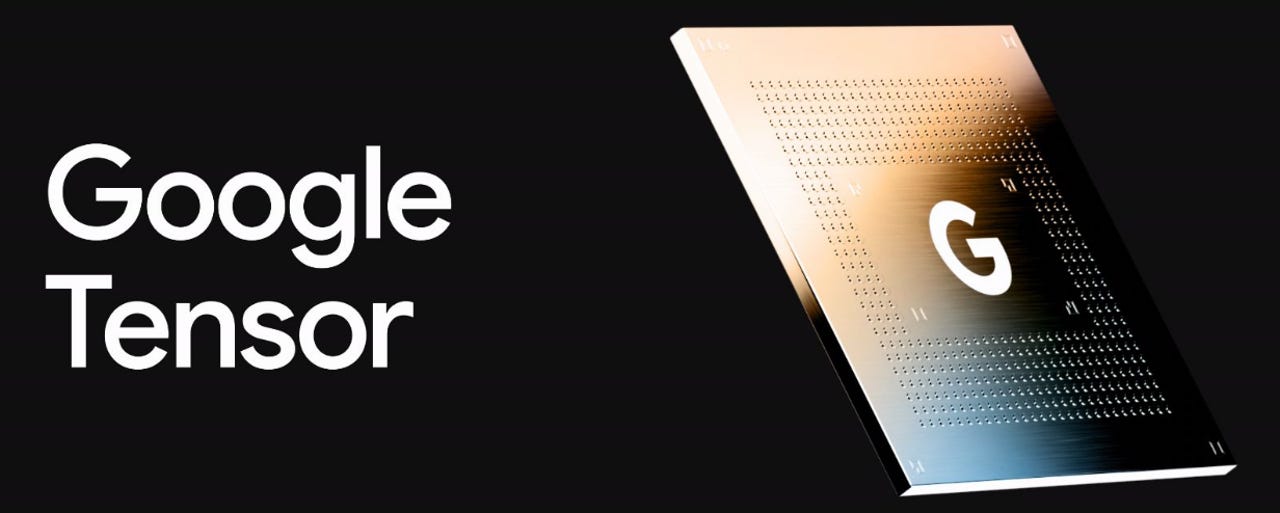































 Image: Google
Image: Google Google has taken the wraps off its latest Pixel smartphones and, among the changes, the one with the biggest long-term impact is the switch to in-house silicon for the search giant.
The days of relying on Qualcomm are over and Google now has more control of its mobile hardware platform.
On a high-level view, a tensor is a mathematical construct that helps explain objects in vector space. The reason why it is useful in computing is because a tensor can be described using a multidimensional array and is how machine learning can also be represented.
Google has attached the Tensor name to its machine learning projects for quite a while. In 2015, it open sourced its TensorFlow ML project, and a couple of years later used the name Tensor Processing Unit for the hardware it created to run AI workloads.
Now that Google is doing its own phone hardware, the Tensor name has been applied to its new system-on-chip.
That's Google's angle on why it needed this chip.
Speaking to journalists, Tensor product manager Monika Gupta said the company felt like it was being held back and wanted a chip that could handle machine learning workloads in a phone.
"We had all this amazing technology in-house state of the art ML models, but we couldn't actually deliver them into Pixel, or we could, but maybe sort of, in a compromised way because we couldn't actually run the most sophisticated, most state-of-the-art ML models that we wanted .... until now, until Tensor."
Gupta added that all of the chip has been designed to help run AI while impacting battery life as little as possible.
The suitable-for-most-humans-stylised schematic shows the chip having a CPU and GPU cluster, an area for security, signal processing, a context hub, and to handle AI, it naturally has Tensor Processing Units.
The CPU cluster consists of two Arm X1 cores for pure performance, two medium Arm A76 cores, and four efficient A55 cores. The Arm-designed Mail-G78 GPU consists of 20 cores that Google says will be enough for a premium gaming experience.
The chip also has a Tensor security core, which is a new system that will do processing on sensitive data separate from the main CPU. The chip also has a new Titan M2 onboard to work beside the Tensor security core.
Google said the Titan M2 has been made resilient to advanced attacks including electromagnetic analysis, voltage glitching, and laser fault injection.
The context hub is used for ultra low power AI, such as the now playing alerts that show on the always-on display when the phone is locked.
Samsung is fabricating the chips on its 5-nanometre LPE process.
Google states the Tensor chip is the fastest chip ever put into a Pixel, but that isn't too hard, since the Pixel 6 predecessor, the Pixel 5, had a 700-series Qualcomm Snapdragon 765G processor instead of the usual 800-series chips.
Benchmarks on the chip are not available, but the search giant said Tensor would work better as a whole, rather than having parts of the chip optimised individually.
"[Previous] CPU and GPU speeds look great on benchmarks but they don't always reflect real-world user experience," vice president of the Pixel business unit Nanda Ramachandran said.
"Pixel 5 is a very good example of our approach. Google software delivered a great experience even on a chip that didn't win on benchmarks."
Here are the top Android phones you can buy.
Read nowAs a chip designed for AI, it should be no shock to learn the real-world impacts are focused on AI.
Functionality such as improved speech recognition, voice typing, live translate, and magic eraser to remove photobombers from pictures are all based on AI.
Google said the best example of its hardware and software working together is the "colour and customisation logic of our new Material You design" that is meant to help pick interface colours that work with your wallpaper and helps the phone "adapt to you".
The company added that many of its personalisation AI models are run in a "secure on-device sandbox" and the data does not leave the device without "explicit action". This data includes captions and translations, suspicious message alerts, and geo data.
Google will not directly state that switching to its own chip will allow it to provide updates for five years. We know this, because we asked them.
"Users will still get at least three years of OS updates, after which we're committing to ensure that Pixels will stay up-to-date and secure. The frequency and categories of updates will depend on the capabilities and needs of the hardware," a spokesperson for the company said in response.
"Tensor enables us to make the Google phones we've always envisioned: Phones that keep getting better, and that tap the most powerful Google innovations in AI and ML to provide maximum helpfulness, all in a highly personalised experience."
The counterfactual is that Google has never offered five years of updates until making this switch.
The AI power of Tensor is also allowing Google to boost its anti-phishing protection across phone calls, text messages, emails, and links to see if something looks suspicious.
Even though Pixels were not best-selling devices, the official Snapdragon account had a bit of a cry on Twitter.
 Etiquetas calientes:
tecnología
Nuestro proceso
Hardware
Etiquetas calientes:
tecnología
Nuestro proceso
Hardware